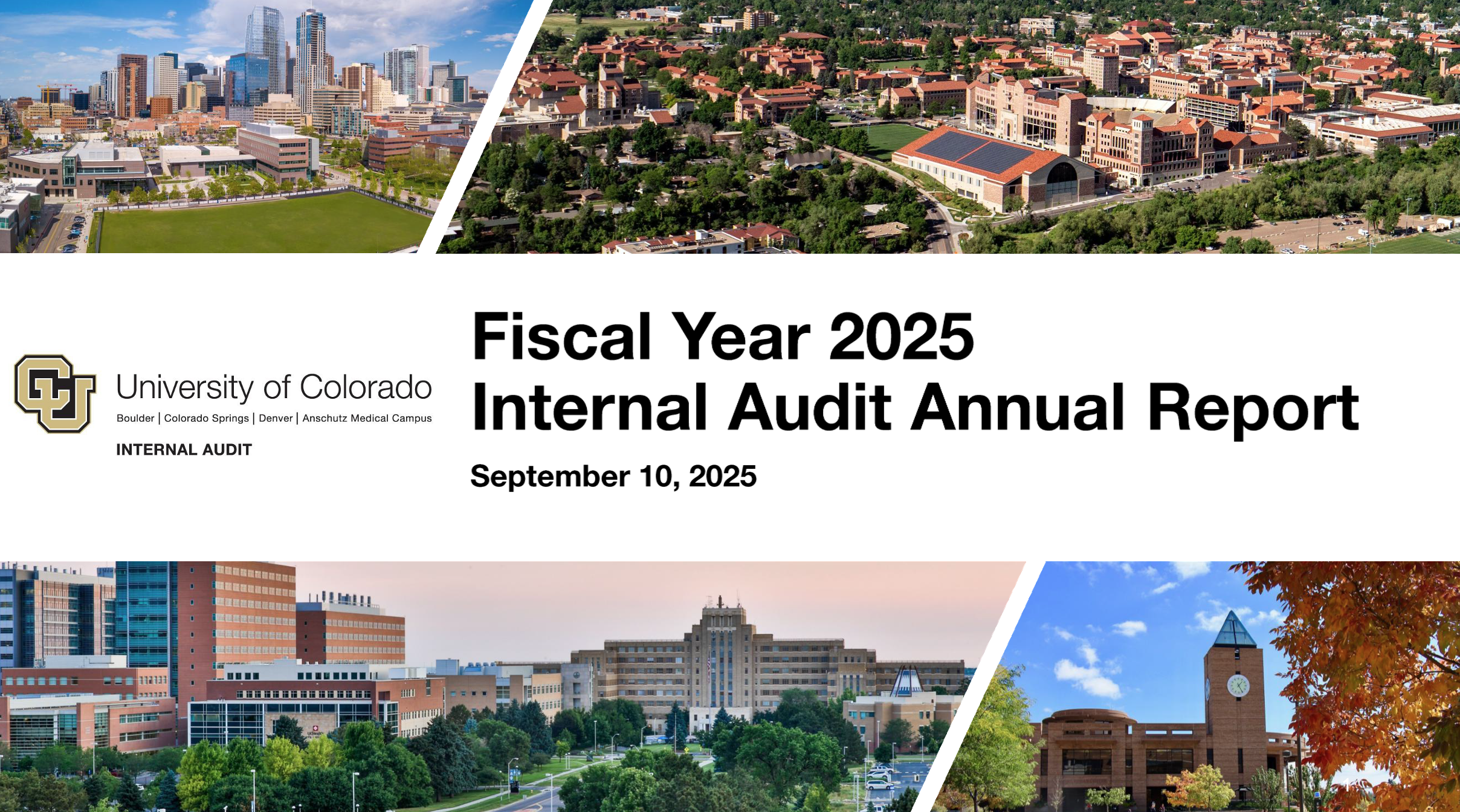
Custom text
Mission Text
Our purpose is to strengthen the university's ability to create, protect, and sustain value by providing the Board of Regents and university management with independent, risk-based, and objective assurance, advice, insight, and foresight.
We carry out our mandate by bringing a systematic, disciplined approach to evaluating and improving the effectiveness of governance, risk management, and control processes across the university system.
We strive to enhance CU's:
- successful achievement of objectives;
- governance, risk management, and control processes;
- decision-making and oversight;
- reputation and credibility with its stakeholders; and
- ability to serve the public interest.
Insight with Impact
- We are trusted partners.
- We deliver timely and relevant perspective on risks and opportunities.
- We are committed to our core values, intellectual curiosity, and alignment with our stakeholders.
CU Ethicsline

Are you aware of questionable ethical practices such as fraud, waste or abuse at the University of Colorado?
Custom text
In conducting our activities, Department personnel apply and uphold the following principles of The Institute of Internal Auditors (IIA) Code of Ethics.
Custom text
Integrity
The integrity of internal auditors establishes trust and thus provides the basis for reliance on their judgment.
Custom text
Objectivity
Internal auditors exhibit the highest level of professional objectivity in gathering, evaluating, and communicating information about the activity or process being examined. Internal auditors make balanced assessments of all relevant circumstances and are not unduly influenced by their own interests or others in forming judgments.
Custom text
Confidentiality
Internal auditors respect the value and ownership of information they receive and do not disclose information without appropriate authority unless there is a legal or professional obligation to do so.
Custom text
Competency
Internal auditors apply the knowledge, skills, and experience needed in the performance of internal audit services.
Custom text
We also comply with other applicable professional standards required by our individual certifications. In performing IT audits, Department team members assigned to the engagement follow the ISACA Code of Professional Ethics. In performing investigations of potential fiscal misconduct, Department team members assigned to the engagement follow the Code of Professional Ethics promulgated by the Association of Certified Fraud Examiners (ACFE).
Custom text
CoreValues-Integrity
“If you have integrity, noting else matters. If you don’t have integrity, nothing else matters.” - Senator Alan Simpson
CoreValues-Accountability
“A culture of accountability makes a good organization great, and a great organization unstoppable.” – Henry J. Evans
CoreValues-Community
“Alone we can do so little; together we can do so much.” – Hellen Keller
CoreValues-Agility
“We cannot solve our problems with the same thinking we used when we created them.” – Albert Einstein
CoreValues-Respect
“Any worthwhile conversation starts with listening.” – Simon Sinek
CoreValues-Excellence In Service
“Every job is a self-portrait of the person who did it. Autograph your work with excellence.” – Jessica Guidobono
Custom text

Custom text
2025 Highlights
- Supported the Regent Audit Committee in fulfilling responsibilities outlined in its annual work plan
- Contributed to a strengthened campus risk management posture through assurance and advisory work
- Expanded integration of data analytics into audits and fiscal misconduct investigations
- Kept pace with increased CU EthicsLine activity and number of fiscal misconduct investigations
- Championed professional growth and veleopment of department team members through support of continuing professional education (CPE) and professional certifications
- Began implementing reccomendations provided in the 2024 eexternal Quality Assessment Review (OAR)
- Aligned several processes with the updated Institute of Internal Auditors (IIA) Global Internal Audit Standards, effective January 2025, including an updated Charter and risk ranking methology
- Engaged with the broader higher education internal audit community through conference presentations, volunteering, and QARs




